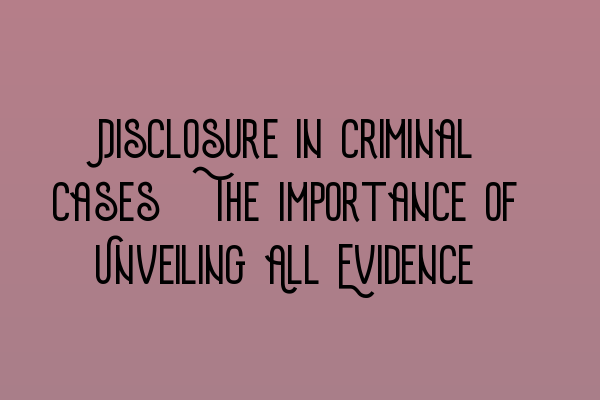Disclosure in Criminal Cases: The Importance of Unveiling All Evidence
Disclosure is a crucial stage in criminal cases that involves the disclosure of all relevant evidence by both the prosecution and the defense. It is the process through which the parties exchange information, ensuring a fair trial where all evidence is presented and considered.
Why is Disclosure Important?
Disclosure plays a critical role in upholding the principles of justice and ensuring a fair trial. It allows the defense to properly prepare their case, assess the strength of the prosecution’s evidence, and identify any weaknesses or inconsistencies. Additionally, it enables the accused to exercise their right to a full and proper defense.
By disclosing all evidence, the prosecution avoids the risk of wrongful convictions and strengthens the overall integrity of the criminal justice system. It ensures that all parties have access to the same information and eliminates the possibility of surprise evidence or procedural unfairness.
Types of Evidence Subject to Disclosure
All evidence that may be helpful or detrimental to the case must be disclosed. This includes:
- Witness statements
- Expert reports
- CCTV footage
- Forensic analysis
- Cellphone records
- Police reports
Failure to disclose any relevant evidence can have serious consequences on the outcome of a trial. It can lead to wrongful convictions, wasted court resources, and damage to the credibility of the prosecution.
Challenges in Achieving Full Disclosure
While disclosure is essential for a fair trial, there are challenges that can hinder the process. These challenges include:
- Volume of evidence: In complex cases, the volume of evidence can be overwhelming, requiring significant time and resources to review and disclose.
- Sensitive information: Certain evidence may be subject to restrictions, such as classified information or materials that could jeopardize national security.
- Legal privilege: Some information may be protected by legal privilege, which cannot be disclosed unless waived by the privilege holder.
- Discovery of new evidence: As investigations progress, new evidence may come to light, requiring further disclosure.
Best Practices for Disclosure
To ensure a smooth and complete disclosure process, it is important to follow best practices, including:
- Thorough case analysis: Undertake a detailed analysis of the case to identify all potential evidence that may be relevant to the defense.
- Timely disclosure: Provide all relevant evidence to the opposing party within the established timelines, as failure to do so can result in serious consequences.
- Document management: Implement effective document management systems to organize and maintain all evidence securely.
- Open communication: Foster open lines of communication with the opposing party, promoting transparency and cooperation.
Conclusion
Disclosure is a fundamental aspect of criminal cases that ensures fairness, transparency, and integrity in the judicial process. It is essential for both the prosecution and the defense to disclose all relevant evidence to guarantee a fair trial. Failure to do so can result in miscarriages of justice and damage the credibility of the criminal justice system.
For more information on SQE Criminal Law & Practice and to prepare for your upcoming exams, check out the following related articles:
